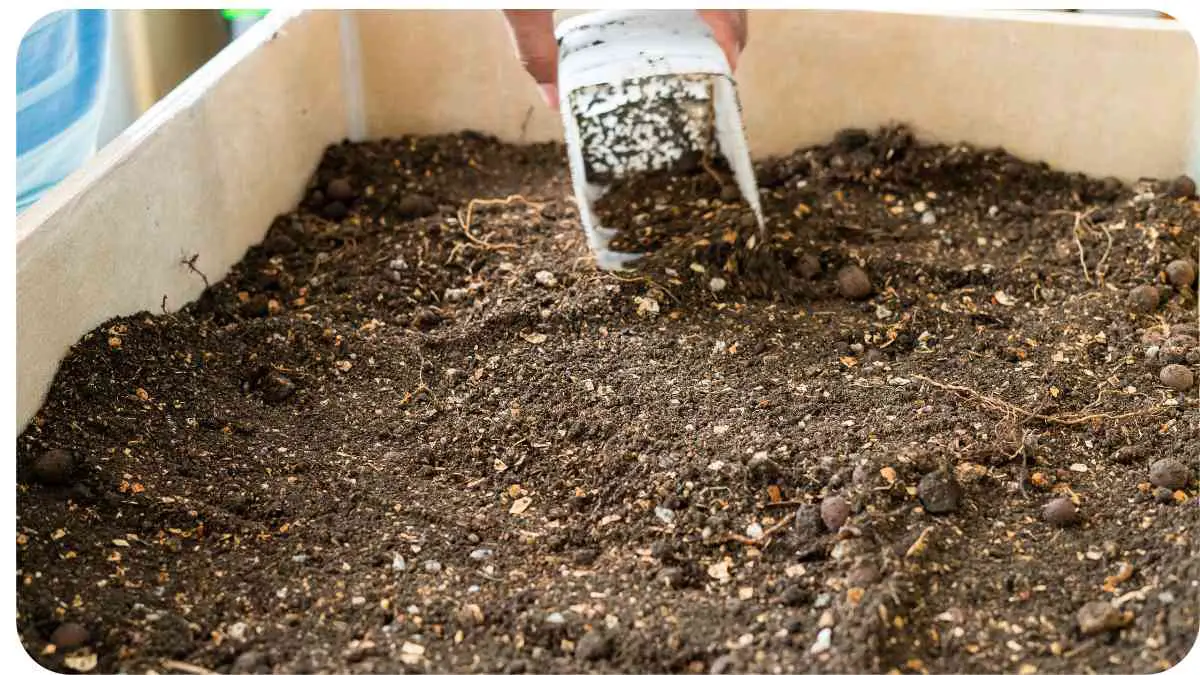Discovering the perfect soil for your container garden is crucial for thriving plants. This guide unravels the secrets of various soil options, providing insights into their benefits and applications.
Whether you’re cultivating vegetables, herbs, or flowers, finding the right soil mix can elevate your container gardening success.
| Takeaways |
|---|
| Understanding the importance of soil for container gardening |
| Knowing the components of good soil |
| Finding the best soil mix for container gardening |
| Maintaining soil quality for healthy container plants |
| Avoiding common soil problems in container gardening |
Coconut Fiber: A Sustainable Marvel for Your Garden
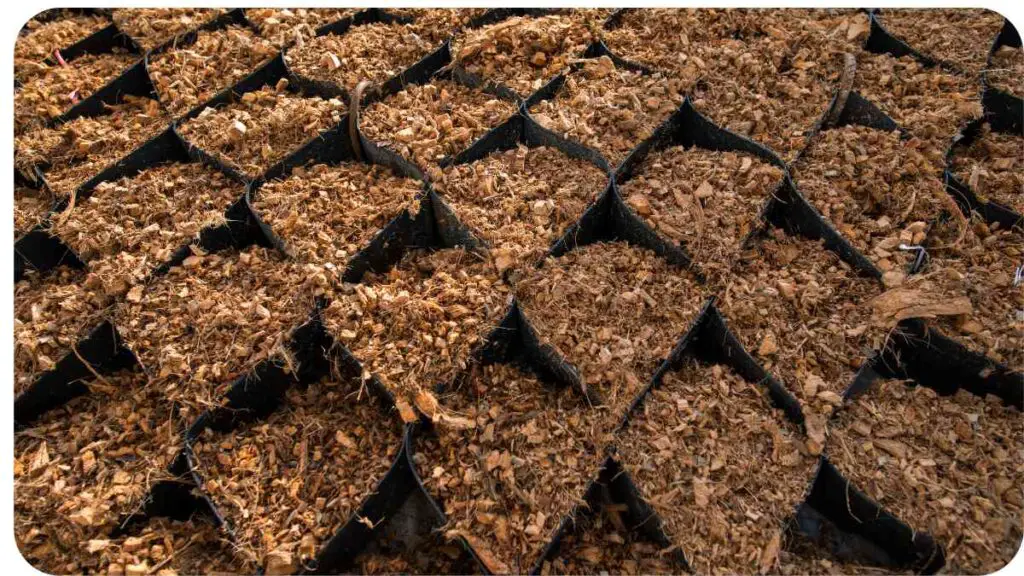
Coconut fiber, a derivative of coconut palm trees, is a gardening gem comprised of husk and coir fiber. These long fibers bring a plethora of benefits to your container garden.
Absorbency and Nutrient-Rich Goodness: Coconut fiber stands out for its exceptional absorbent qualities, creating an ideal environment for plants by retaining water and essential nutrients. This unique composition ensures a balance of moisture and aeration crucial for plant health.
Sustainability Triumph: Unlike traditional options like peat moss or coir, coconut fiber emerges as a sustainable choice. Harvested from coconut husks, its production aligns with eco-friendly practices, making it a top pick for environmentally conscious gardeners aiming to diminish their carbon footprint.
Natural Pest Repellent: One remarkable feature of coconut fiber is its ability to deter pests. Fungus gnats and other soil-dwelling insects, attracted to decomposing organic matter, are kept at bay. Additionally, it acts as a shield against mold spores that can wreak havoc on your plants’ leaves and fruit buds.
Chemical-Free Defense: For those wary of chemical insecticides compromising the purity of home-grown produce, coconut fiber provides a natural defense strategy. By naturally repelling pests, it allows you to cultivate fruits and vegetables with confidence, free from harmful chemical residues.
If you’re new to fertilizing your lawn, you might be wondering how to get started. Our guide on how to fertilize your lawn yourself has practical tips and step-by-step instructions to ensure you do it right the first time.
Coir Fiber: The Hydration Hero for Container Gardens
Derived from coconut husks, coir fiber proves itself as a powerhouse in container gardening, particularly for its exceptional water-holding capacity. Here’s why coir is a game-changer for your plants:
Moisture Mastery: Coir fiber’s standout feature is its ability to hold a substantial amount of water. This property ensures that your container garden maintains optimal moisture levels, providing a consistent and nurturing environment for your plants. This is especially beneficial for plants with varied drainage and moisture requirements.
Even Distribution for Plant Prosperity: Coir fiber excels in ensuring the even distribution of moisture throughout the soil. This quality is invaluable for container gardening, creating a harmonious balance that caters to the needs of both moisture-loving and well-draining plants. Your garden becomes a haven where every plant thrives.
Ideal for Container Gardening Newbies: For beginners venturing into container gardening, coir is a fantastic choice. Its user-friendly nature simplifies the process, offering an optimal blend of nutrients and water to support your plant’s health. Embrace coir to kickstart your gardening journey with confidence.
A Gateway to Greenery: If you’re eager to delve into the world of growing your own food or expanding your gardening knowledge, coir serves as an excellent introduction. Its versatility and effectiveness in container gardening make it a must-have for those aspiring to cultivate a thriving garden
| Benefits | Description |
| High water-holding capacity | Ensures optimal moisture levels for plants, making it suitable for varied plant needs. |
| Even distribution | Promotes uniform moisture throughout the soil, catering to the requirements of different plants in container gardens. |
| Ideal for beginners | A user-friendly choice for those new to container gardening, providing the right balance of nutrients and water for plant health. |
| Versatile | Suitable for a wide range of plants in container gardens, offering adaptability and ease of use for gardeners at any skill level. |
Benefits of Coir Fiber in Container Gardening
| Benefits | Description |
|---|---|
| High water-holding capacity | Coir fiber has excellent water retention properties, which helps keep the soil moist and at an even moisture level. |
| Good drainage | Despite its water-holding properties, coir fiber also allows for good drainage, preventing soil compaction and root rot. |
| Neutral pH | Coir fiber has a neutral pH, which means it doesn’t significantly affect the pH of the soil. |
| Eco-friendly | Coir fiber is a renewable resource, made from the outer husks of coconuts, and is biodegradable. |
| Versatile | Coir fiber can be used alone or blended with other soil components to create a custom soil mix that meets the specific needs of plants. |
Composted Manure: Nutrient-Rich Elixir for Container Gardens
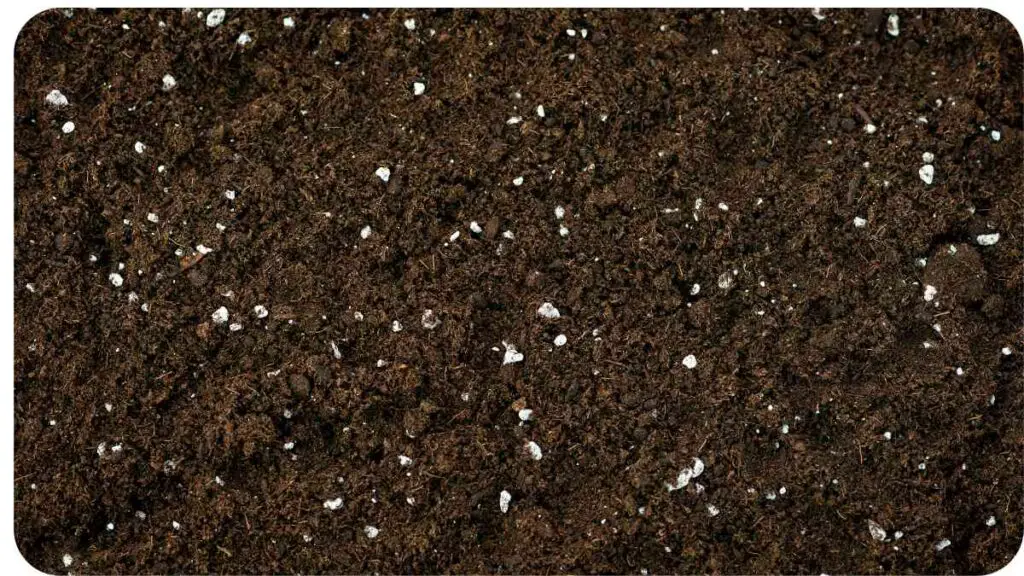
In the realm of container gardening, composted manure emerges as a stellar source of essential nutrients, organic matter, calcium, and magnesium. Let’s explore why this gardening elixir is a vital component for your potted plants:
Nutrient Abundance: Composted manure stands out as a nutrient powerhouse, offering a rich blend that encompasses crucial elements for plant growth. Nitrogen, phosphorus, and potassium, among other micronutrients, are present in abundance, providing a balanced diet for your container plants.
Organic Matter Boost: Container gardens thrive on organic matter, and composted manure delivers in this aspect. The organic content enhances soil structure, promotes water retention, and fosters a healthy microbial environment. This, in turn, creates a thriving foundation for your plants.
Calcium and Magnesium Bonanza: The calcium and magnesium content in composted manure contributes to overall plant health. These essential minerals aid in root development, strengthen cell structures, and play a pivotal role in various metabolic processes crucial for robust plant growth.
Container Garden Nourishment: Specifically tailored for container gardening, composted manure serves as a tailored nutrition solution. Its ability to provide a steady release of nutrients ensures that potted plants receive a continuous supply of nourishment, fostering optimal growth and productivity.
Environmental Sustainability: Utilizing composted manure aligns with sustainable gardening practices, as it repurposes organic waste into a valuable resource. This eco-friendly approach not only benefits your garden but also reduces the environmental impact of organic waste.
Incorporate composted manure into your container gardening routine to witness a transformation in plant vitality. This nutrient-rich blend not only supports your plants’ immediate needs but also contributes to the long-term health and sustainability of your container garden.
Gardening gloves are an essential tool for any gardener, but choosing the right type can make a big difference. Check out our article on what kind of gloves are good for gardening to learn about the different types of gloves available and how to choose the right pair for your needs.
Peat Moss: Nature’s Nutrient-Rich Blanket for Container Gardens
Peat moss, crafted from decaying plant matter, takes center stage in gardening for its unique blend of benefits. Tailored for container growing, let’s unveil the reasons why peat moss is a preferred choice for nurturing your potted plants:
Natural Nutrient Enrichment: Derived from the decomposition of plant material, peat moss serves as a natural reservoir of nutrients. While it doesn’t inherently contain fertilizers, it acts as a nutrient carrier, enhancing the soil’s nutritional profile and supporting your plants’ growth.
Moisture Retention Maestro: Container gardens demand a delicate balance of moisture, and peat moss excels in this arena. Its ability to retain water ensures a consistent and optimal hydration level for your plants. This feature is especially beneficial for potted plants that may require more attention to moisture.
Light Texture, Easy Handling: The light and airy texture of peat moss makes it a joy to work with in container gardening. Its fluffy consistency contributes to well-aerated soil, preventing compaction and providing an ideal environment for root development.
Fertilizer-Friendly Choice: Peat moss is an excellent alternative to traditional potting mixes, offering a neutral base without added fertilizers or additives. This makes it a versatile choice for gardeners who prefer a more customizable approach, allowing them to tailor the nutrient content based on specific plant needs.
Gentle on Sensitive Plants: The absence of chemical fertilizers in peat moss makes it a gentle choice for sensitive plants, such as houseplants. Unlike some bagged potting mixes, peat moss won’t pose a risk of burning your plants with excessive chemicals, ensuring a nurturing environment for even the most delicate green companions.
Versatility in Planting Mixes: Beyond its standalone use, peat moss serves as a versatile component in planting mixes. Its adaptability allows you to experiment and create custom blends, catering to the diverse needs of your container garden.
Simple Maintenance with Water: Peat moss simplifies your gardening routine. Once your seedlings or plants are established, all you need is water. This minimalistic approach aligns with the ease and simplicity that container gardening enthusiasts often seek.
Perlite: Elevating Container Gardening with Lightweight Brilliance
In the realm of potting soils, perlite reigns as a stalwart ingredient for a multitude of reasons. This lightweight, white material, renowned for its ability to expand when moistened, brings a breath of fresh air to your container garden. Let’s uncover why perlite is a must-have for your potted plants:
Aeration Champion: Perlite’s unique characteristic lies in its lightweight composition. When wet, it expands, creating air pockets within the soil. This aeration prowess is a game-changer for container gardens, ensuring optimal oxygen availability to plant roots. Improved aeration prevents soil compaction and, most importantly, guards against the dreaded root rot.
Swift Drainage Superpower: Container gardens demand efficient drainage, and perlite delivers. The abundance of air and water-holding capacity in perlite promotes quicker draining of potting soils. This swift drainage not only prevents waterlogged conditions but also fosters a well-balanced environment for plant roots.
Sustainability in Blending: For the environmentally conscious gardener, perlite offers a sustainable solution. By incorporating 75 percent organic matter (such as compost or peat moss) with 25 percent perlite, you create a balanced and eco-friendly container garden soil. This blend caters to the needs of plant roots, ensuring both happiness and sustainability.
Happy Roots, Happy Plants: The perlite-organic matter blend becomes a haven for plant roots, providing an ideal mix of aeration, water retention, and nutrient availability. As roots breathe comfortably and moisture is regulated, your plants flourish without the need for expensive additives.
Cost-Effective Brilliance: Opting for a perlite-based mix doesn’t just benefit your plants—it’s also a savvy financial choice. Perlite’s affordability allows you to create a high-quality soil blend without breaking the bank. This cost-effectiveness aligns perfectly with the practicality sought by container garden enthusiasts.
If you’re using Miracle-Gro garden feeder but not sure how often to use it, we’ve got you covered. Our guide on how often should you use Miracle-Gro garden feeder provides expert advice and tips to help you keep your plants healthy and thriving.
Rockwool: A Sterile Oasis for Accelerated Plant Growth
As you embark on your gardening journey, the choice of container media becomes pivotal. Enter rockwool, a popular selection revered for its sterile, inert nature and exceptional benefits for plant growth. Let’s unravel why rockwool is a go-to option for fostering thriving greenery in your containers:
Sterility Unleashed: Rockwool distinguishes itself as a sterile and inert material. Devoid of nutrients that could fuel bacterial or fungal growth, it creates a hygienic haven for your plants. This sterile environment ensures that your plants are shielded from the threats of contamination, promoting a healthy and disease-free atmosphere.
Drainage and Aeration Mastery: One of rockwool’s standout features is its prowess in drainage and aeration. The structure of this spun-fiber material allows for optimal air circulation around plant roots. This, coupled with excellent drainage capabilities, propels faster root growth compared to traditional soil-based mediums. The result: vibrant and robust plants.
Rockwool’s Origins: Derived from melted rock and transformed into fibers resembling cotton candy, rockwool earns its name from its unique composition. This manufacturing process ensures a material that is both lightweight and effective, making it a versatile choice for container gardening.
Indoor Gardening Sanctuary: The sterile nature of rockwool makes it a game-changer for indoor gardening. By opting for this alternative growing medium, you eliminate concerns about contamination from pests or diseases present in outdoor soil. Your indoor garden becomes a pristine space where your plants can thrive without external threats.
Advantages of Rockwool as Container Media
| Advantages | Description |
|---|---|
| Sterile and inert | Rockwool is a sterile, inert material that does not support bacteria or fungi growth, reducing the risk of pests and diseases. |
| Excellent drainage | Rockwool provides excellent drainage, preventing waterlogging and soil compaction. |
| Good aeration | The structure of Rockwool provides plenty of air pockets for root growth, promoting fast plant growth. |
| Highly customizable | Rockwool is available in many shapes and sizes, making it easy to fit into any container garden. |
| Reusable | Rockwool can be washed and sterilized for reuse, making it an eco-friendly option for container gardening. |
Vermiculite: Unleashing Expansion for Thriving Plants
In the world of gardening, vermiculite emerges as a transformative natural mineral with a unique ability to expand up to fifteen times its original size upon contact with water. Let’s explore why vermiculite is a go-to choice for enriching your soil and fostering plant prosperity:
Expansion Marvel: The remarkable characteristic of vermiculite lies in its impressive expansion when hydrated. This quality, allowing it to swell multiple times its size, contributes to improved soil structure and water retention. As vermiculite absorbs water, it creates a nurturing environment for plant roots.
Versatility as a Soil Amendment: Vermiculite’s versatility shines as both a soil amendment and an essential ingredient in potting mixes. Its expansive nature enhances aeration and moisture retention, fostering optimal conditions for plant growth. This makes it an invaluable addition to various gardening applications.
Worm Castings Wizardry: Beyond its role in soil enhancement, vermiculite proves to be a wizard in the realm of composting. Utilizing vermiculite to make worm castings adds a nutrient-rich dimension to your soil. Worm castings, a byproduct of vermiculite-enhanced composting, become a powerhouse of nourishment for your plants.
Indoor and Outdoor Plant Support: Whether you’re cultivating a small indoor garden or tending to plants outdoors, vermiculite is a versatile ally. Its ability to create a well-balanced soil environment makes it particularly beneficial for helping small plants thrive, regardless of their location.
Fertilizing your lawn is important for a lush, green lawn, but it’s equally important to know how often should dogs stay off of fertilized grass. Our article on how often should dogs stay off of fertilized grass provides practical tips and insights to help you safely fertilize your lawn while keeping your furry friends safe.
Peat Moss and Perlite Mixture: A Dynamic Duo for Container Gardening
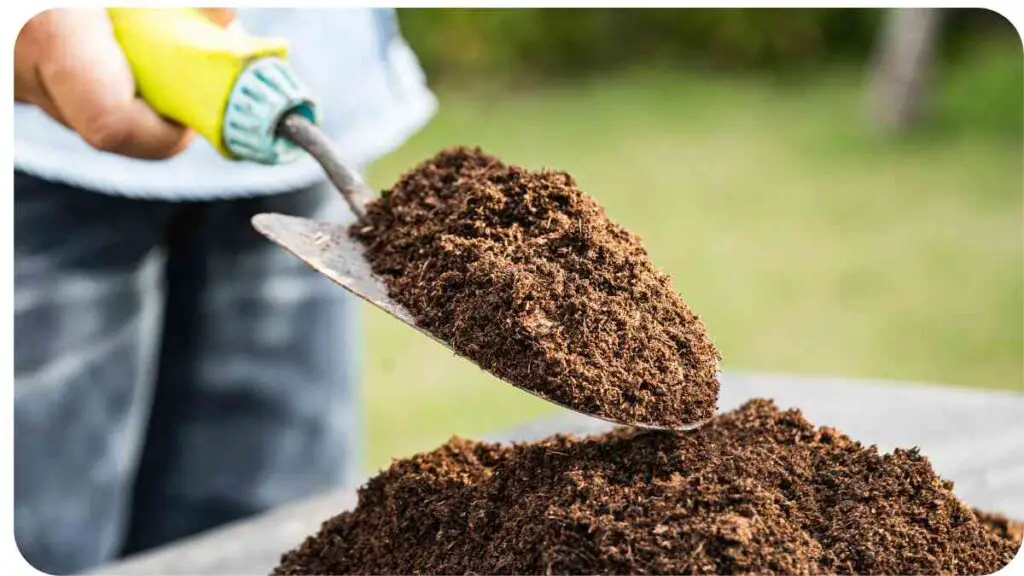
In the realm of container gardening, the marriage of peat moss and perlite emerges as a winning combination, especially suited for starting seeds and transplanting young plants. Let’s delve into why this blend is a powerhouse for your potted green companions:
Ideal for Container Gardening: The peat moss and perlite mixture proves its mettle in container gardening scenarios. Whether you’re kickstarting seed growth or nurturing young plants, this blend provides an optimal environment for their development, ensuring healthy growth and robust root systems.
Peat Moss’s Water-Holding Prowess: Peat moss, derived from decomposed vegetation, boasts exceptional water retention capabilities. When moistened, it acts like a sponge, holding water and delivering it gradually to plant roots. This characteristic ensures consistent hydration, vital for sustained plant health and vitality.
Perlite’s Aeration Advantage: In tandem with peat moss, perlite contributes to improved soil aeration and drainage. Its lightweight, porous structure creates air pockets within the soil, promoting healthy root development and preventing waterlogging. This aeration prowess safeguards against root rot and enhances overall plant vigor.
Peat Moss: A Dense, Moisture-Retaining Medium: Peat moss, formed from decomposed sphagnum moss, presents as a dense material with remarkable water-holding properties. Its sponge-like nature ensures efficient moisture retention, crucial for maintaining plant hydration levels. Unlike sand, peat moss remains stable even when dry, reducing the risk of soil erosion.
Enhanced Performance with Pre-Treated Products: Opting for pre-treated peat soil mixes or peat pellets streamlines the gardening process. These specially formulated products alleviate the need for additional fertilizers or amendments, saving time and resources while ensuring optimal plant nutrition and growth.
Clay Soil Mix: Harnessing Moisture Mastery for Container Abundance
Clay soil takes center stage in container gardening, celebrated for its remarkable moisture retention capabilities and the promise of reduced watering frequency. Uncover why a clay soil mix is a strategic choice, especially when cultivating vegetables or herbs in containers:
Moisture Mastery: Clay soil’s standout feature lies in its adeptness at retaining moisture. This quality ensures a consistent and well-hydrated environment for your container plants. The ability to hold onto moisture is particularly beneficial for plants that thrive in stable and evenly moist conditions.
Reduced Watering Frequency: For those seeking a container garden medium that minimizes the need for frequent watering, clay soil emerges as a reliable solution. Its inherent water retention capacity means you can enjoy lush and thriving plants with less effort spent on maintaining hydration levels.
Ideal for Vegetables and Herbs: The suitability of clay soil for container gardening shines, especially when cultivating vegetables or herbs. These plant varieties often benefit from the moisture-rich environment provided by clay soil, contributing to robust growth and bountiful yields.
Considerations for Tree Planting: While clay soil proves advantageous for vegetables and herbs in containers, it’s crucial to consider the context of tree planting. When opting for containers placed outdoors on the ground, the weight and density of clay soil may pose challenges for root growth. In such cases, alternative soil mixes that provide a balance of nutrients and promote easier root expansion may be more suitable.
Tailored Medium for Container Abundance: The strategic use of clay soil in your container gardening endeavors creates a tailored medium that aligns with the specific needs of moisture-loving plants. Its unique properties contribute to the overall health and vitality of your container garden, offering a practical solution for those seeking efficient water management.
Pests can wreak havoc on your herb garden if not properly managed. Our article on how to keep pests out of herb garden provides expert advice and practical tips to keep your herb garden healthy and free from pests.
Unlocking the Potential of Sphagnum Peat Moss in Container Gardening
Sphagnum peat moss emerges as a versatile and cost-effective option for nurturing container plants, boasting lightweight properties and exceptional water retention capabilities. Here’s why sphagnum peat moss deserves a place in your gardening toolkit:
Lightweight Advantage: The lightweight nature of sphagnum peat moss makes it an ideal choice for container gardening. Its manageable density facilitates ease of handling and potting, ensuring a seamless planting experience for gardening enthusiasts of all levels.
Water Retention Mastery: One of sphagnum peat moss’s most prized attributes is its unparalleled ability to retain water. Acting as a reservoir, it efficiently holds moisture within the soil, providing a consistent water supply to plant roots. This inherent trait is invaluable, especially in arid climates or for plants with specific hydration needs.
Accessibility and Affordability: Sphagnum peat moss stands out for its accessibility and affordability. Widely available in gardening stores and nurseries, it offers a budget-friendly solution for enhancing soil quality in container gardens. Its cost-effectiveness ensures that you can enjoy the benefits of premium soil without exceeding your gardening budget.
Additional Insights on Sphagnum Peat Moss:
- Versatile Application: Sphagnum peat moss is well-suited for various container gardening projects, including growing vegetables, herbs, flowers, and ornamental plants. Its adaptability makes it a versatile medium for a wide range of plant species.
- pH Neutrality: Sphagnum peat moss typically maintains a neutral pH level, providing a stable and balanced environment for plant growth. This pH neutrality allows for optimal nutrient uptake and root development, promoting healthy and vigorous plant growth.
- Environmental Considerations: While sphagnum peat moss offers numerous benefits for container gardening, it’s essential to consider the environmental impact of its extraction. Sustainable harvesting practices ensure the preservation of peatlands and the long-term availability of this valuable resource.
Optimizing Garden Bliss: The Potting Soil and Vermiculite Symphony
Elevate your gardening experience by embracing the dynamic duo of potting soil and vermiculite. This harmonious blend, enriched with the unique qualities of vermiculite, enhances your garden’s structure, ensuring optimal drainage and moisture retention. Here’s why the potting soil and vermiculite partnership deserves a prime spot in your gardening repertoire:
Vermiculite’s Marvelous Contribution: Derived from mica, vermiculite is a mineral with transformative properties. When exposed to heat, it expands, and upon cooling, it contracts. This natural expansion and contraction make vermiculite a game-changer in gardening, promoting improved soil structure and aeration.
Enhanced Drainage and Moisture Retention: The marriage of vermiculite with potting soil creates a winning formula for garden success. Vermiculite’s lightweight and porous nature introduce air pockets into the soil, preventing compaction and promoting efficient drainage. Simultaneously, it acts as a moisture-retaining agent, ensuring a balanced and consistent water supply for your plants.
Ideal Solution for Challenging Soils: If you find yourself contending with dry weather or challenging soil conditions, the potting soil and vermiculite blend come to the rescue. Vermiculite’s moisture-retaining capabilities are particularly valuable in areas with dry climates or soils that struggle with proper drainage, such as sandy or clay-like compositions.
Versatility in Garden Applications: The potting soil and vermiculite blend’s versatility extends to various gardening applications. Whether you’re nurturing potted plants, container gardens, or raised beds, this blend adapts to different settings, catering to the unique needs of your plants.
Environmental Considerations: While enjoying the benefits of vermiculite, it’s essential to consider sustainability and responsible sourcing. Ensure that the vermiculite used in your gardening endeavors adheres to ethical harvesting practices, contributing to both environmental preservation and garden prosperity.
Perfect Harmony: Coarse Sand, Compost, and Garden Soil Ensemble for Thriving Containers
Unlock the secret to vibrant and flourishing container plants with the impeccable blend of coarse sand, compost, and garden soil. This dynamic trio, thoughtfully combined, creates a growing medium that ensures optimal drainage, nutrient-rich sustenance, and a lightweight environment for your potted green companions. Here’s why this blend stands out as a stellar choice for your container gardening endeavors:
Porous Power of Coarse Sand: Coarse sand takes the lead in this blend, bringing its porous and well-draining qualities to the forefront. This feature prevents water retention, ensuring that excess moisture doesn’t linger in the soil. Additionally, the lightweight nature of coarse sand provides an added advantage, preventing undue stress on your containers.
Compost’s Nutrient Infusion: Compost, a cornerstone of organic gardening, steps in to provide a nutrient-rich boost to your soil mixture. Packed with essential nutrients, compost fosters robust and healthy plant growth. The inclusion of compost introduces a natural and sustainable source of nourishment, contributing to the overall vitality of your container plants.
Choosing the Right Compost: When selecting compost for your blend, prioritize chemical-free or organic options. Composts derived from animal manures or plant materials collected in an eco-friendly manner are ideal. For an extra touch of excellence, consider incorporating worm castings—an exceptional choice if locally available and permitted by your municipality.
Balancing Texture and Depth: The combined prowess of coarse sand and compost adds nutrients to the soil without compromising its texture. This blend strikes the perfect balance, offering a well-aerated and nourishing environment for your plants. If you desire additional depth in your container gardening, complement the blend with a high-quality bagged garden soil.
Environmental Consciousness: Embrace environmentally friendly practices by choosing composts produced without pesticides or herbicides. This conscious selection aligns with sustainable gardening principles, promoting a healthier ecosystem for both your plants and the surrounding environment.
Conclusion
In this exploration of diverse soil blends for container gardening, we’ve delved into a rich tapestry of options, each holding the potential to elevate your gardening experience. Now equipped with insights into the characteristics of coconut fiber, the water-holding prowess of coir, the nutrient-rich compost, the moisture-retaining peat moss, the lightweight perlite, the sterile and efficient rockwool, the expansive vermiculite, and the harmonious blends of sand, compost, and garden soil – you’re poised to make choices that cater to your plants’ unique needs.
As you embark on your gardening journey, remember that the true essence lies not just in the final result, but in the joy found in the process. Gardening is a dynamic venture, an ever-evolving canvas where experimentation is not only encouraged but celebrated. So, whether your garden flourishes exactly as planned or takes unexpected turns, relish the journey.
In the spirit of environmental consciousness, consider sustainable practices and responsible sourcing. Opt for components that not only nurture your plants but also contribute positively to the ecosystem. Your garden is not just a collection of plants; it’s a thriving ecosystem that you have the privilege to nurture.
The Further Reading section offers avenues to deepen your gardening wisdom, with expert insights and practical tips. Explore these resources to continue your journey towards horticultural mastery.
In closing, may your garden bloom with vitality, each plant a testament to your care and dedication. Embrace the joy, savor the surprises, and revel in the beauty of a flourishing container garden. Happy gardening!
Further Reading
Miracle-Gro’s Best Soil to Use in Containers and Raised Beds: A comprehensive article on the best soil to use in containers and raised beds, with expert tips and advice from Miracle-Gro.
Frugal Family Home’s Best Soil for Container Gardening: This article provides practical and low-cost solutions to finding the best soil for container gardening, with tips and tricks from the Frugal Family Home.
University of Illinois Extension’s Soil for Container Gardening: A comprehensive guide to soil selection for container gardening, with insights and recommendations from the University of Illinois Extension.
Here’s the FAQs section based on the semantic of the title:
Soil for Container Gardening FAQs
What is the best soil for container gardening?
The best soil for container gardening is a well-draining soil mix that contains the right ratio of organic matter, such as compost, peat moss or coconut coir, and inorganic matter, such as perlite or vermiculite.
How often should I water container gardens?
The frequency of watering your container gardens can vary depending on many factors, such as the type of plant, the pot size, and the weather conditions. Generally, you will need to water container gardens more frequently than in-ground gardens, especially during hot and dry weather.
Can I reuse soil from previous container gardens?
Yes, you can reuse soil from previous container gardens. However, it’s important to amend the soil by adding fresh compost and other organic matter to replenish the nutrients and improve soil quality.
What are the common problems with soil in container gardening?
The common problems with soil in container gardening are over-watering, under-watering, poor soil quality, and soil-borne diseases and pests. Proper watering, soil amendments, and preventive measures with pest control can mitigate these issues.
How can I improve soil quality for container gardening?
You can improve soil quality for container gardening by adding organic matter such as compost, leaf mold or aged manure, and inorganic matter such as perlite, sand or vermiculite to the soil mix. Proper drainage and moisture retention are also important for healthy soil.
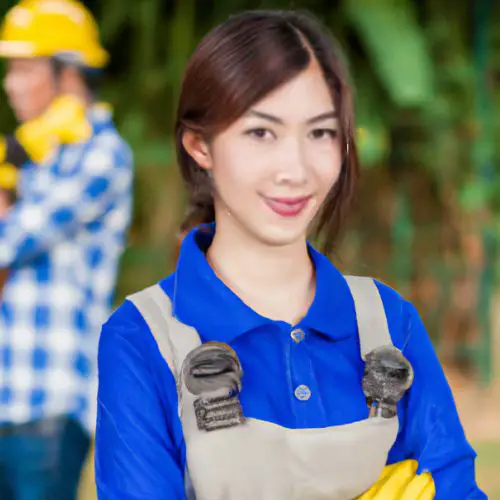
Hi! My name is Hellen James, and I’m here to help you with your home-maintenance needs. Whether it’s building a better yard or just trying to fix a garden—I can show you how.

